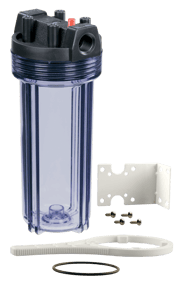BoshartU was born from a collaboration with multiple departments at Boshart like Quality Assurance, Research and development and Sales and Marketing. We write blogs to educate you on plumbing, water well, Waterworks, HVAC, irrigation, industrial, pool and spa and sump and sewage products.
We have created a series where we take our blogs, starting from the very beginning, and put them into videos.
To view all of our blogs that we have turned into videos, head to BoshartU & don’t forget to subscribe!
This video is based off of a blog we wrote called “The Basics on Water Filtration". The original blog was published on January 3, 2019. To view the original blog, check it out here. Or, read the transcript below.
Transcript
Introduction
Hi, I'm Braedlyn McEwen and today we're going to talk about filtration. Filtration products help to ensure that the water coming into your house, from a well or municipal water sources, are free of sediment, odor and bad taste.
In this video, we will walk through different water filtration products, point of entry vs point of use filtration and the difference between pre and post filtration.
Filtration Products
What are water filtration products? It is important to remember if your water source contains unsafe bacteria, this type of filtration will not remove it. To filter out unsafe bacteria, you need to use RO or UV system that is designed to kill bacteria.
Filter Housings
Okay, let's talk about filter housings. Filter housings come in a variety of sizes depending on the type of cartridge and flow rate needed. They also come in different sizes to accommodate certain insulation restrictions. When space is limited, you can utilize a slim filter housing to reduce the footprint.
cartridge and flow rate needed. They also come in different sizes to accommodate certain insulation restrictions. When space is limited, you can utilize a slim filter housing to reduce the footprint.
There are different types of housings and cartridges to solve different types of problems, for example, if you are drawing water out of a well that contains a lot of sediment, a spin out filter may be required as this housing is specifically meant for sediment removal, where our water filtration products mainly used filtration products are used in a variety of locations. They are used not only for water well applications but also in Municipal Water applications.
Filtration can be used in Residential, Commercial and Industrial sectors because of the common problems that they solve. There are four main types of filtration uses.
Point of Entry
Point of entry. This type of filter is used when the water is entering the house before it gets to any taps or appliances. They typically use larger filters to achieve the desired flow rate. Items such as sediment filters are an example of a point of entry filters as this is better done right as the water enters the house. These filters are usually installed close to your pressure tank and would be more commonly seen if the water source is from a well.
Point of Use
Point of use. So, this type of filtration is generally used right before a tap or other water source that will be used. For example, many people install carbon POU filters on their sink tap to remove poor taste and odor. The most common filter cartridges to use for point of use applications are active carbon. These filters are common for both well and municipal water sources.
Pre & Post Filtration
So, pre and post filtration. This type of filtration is generally used before other filtration systems such as Reverse Osmosis or UV. These types of systems need the water to be filtered to a certain level before they can remove bacteria from the water. If there is too much sediment going into a UV system, it will not properly filter the water as the bacteria can hide the sediment. This is where a pre-filter system would be used.
If you are using an RO system, having a pre-filter will ensure that your filter stay cleaner longer, which will save money on filter purchases. So, why is water filtration important? Filtration is very important, especially from water well applications. The type of well water that is coming into your house will determine the type of filtration system that you should use.
Some well water will have an obvious need for filtration, if there are high levels of sediment other well water will look clean, but may have a bad odor or bacteria that is not able to be seen by the eye. Remember that your well water should always be tested and retested to determine if there is bacteria present only an RO or UV system will filter out harmful bacteria.
Generally speaking, if you have well water coming into your house, you should have some kind of filtration. This will help to address taste and odor problems as well as increase the lifespan of the RO or UV system filters.
Many people who have Municipal Water also use water filtration depending on where you are located. Municipal Water can have odd taste and bad odors, filtration can help get rid of these issues. Many people use point of use filtration for municipal water as it generally won't have any sediment or major issues coming into your house.
Conclusion
To sum all this up, many people make choosing the proper water filtration solution difficult but it is very simple. The first and most important thing that you need to do is identify the problem. Once you have done this, your filter type will essentially be chosen for you and then the housing options will be selected based on your needed flow rate and available install space. Remember that even though there are many water filtration options out there, it is really a simple process. Thanks and have a good day.
This video is based off of a Blog called "The Basics of Water Filtration" to see the original full article, head to boshartu.com.
Have further questions about this subject?
Head over to Boshart's Knowledge Base: technical product information, guidelines, and more.




![[Video] Water Filtration vs Water Treatment & Why They are Not the Same](https://blog.boshart.com/hubfs/2022-04-27%20Filtration%20Promo%20Photos-12-1.jpg)

SHARE